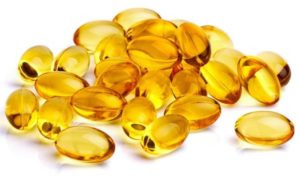I’ve been recommending fish oil supplements to help lower triglycerides to my patients for 20 years now, and I’ve seen the benefits with my own eyes.
Fish Oil Lowers Triglycerides
 Fish oil contains omega-3 fatty acids from polyunsaturated fats, which are beneficial in treating numerous conditions, from asthma to osteoporosis.
Fish oil contains omega-3 fatty acids from polyunsaturated fats, which are beneficial in treating numerous conditions, from asthma to osteoporosis.
But where they really shine is in helping prevent heart disease.
In fact, I generally prescribe fish oil over prescription drugs as my first line of therapy to lower triglycerides.
Fish oil also reduces inflammation, the process that initiates heart disease.
If that wasn’t enough, fish oil also has an anti-clotting effect on the blood, which helps to reduce the risk of heart attack.
Fish Oil Dosage Recommendations
I recommend taking 2,000 mg of fish oil daily. If you’re already taking blood thinners such as Plavix or Coumadin, keep an eye out for telltale bruising.
This indicates that your blood is being thinned too much, and you should stop taking the fish oil.
Treatment For High Triglycerides
Those who have a high triglyceride reading may need to take a prescription version of omega-3 fatty acid medicine rather than simply taking over the counter fish oil supplements. The prescription is a more concentrated form of omega-3 and will need to be prescribed from your doctor. Examples include Epanova, Lovaza, and Vascepa
Fish Oil Side Effects
Consuming any products do often come with certain side effects.
- Thinned Blood: One of the benefits of the Fish Oils Omega-3 is it’s blood anti-clot properties. Those who see increased signs of bruising should consult their physician.
- Side Effects: Some patients can experience nausea, diarrhea, belching and fish taste when supplementing their diet with Fish Oil. Again consult your physician if you’re experiencing irregular effects.
- Weight Gain: Fish oil, like most oils do contain extra calories. Those who take large amounts need to look for signs of weight gain.

